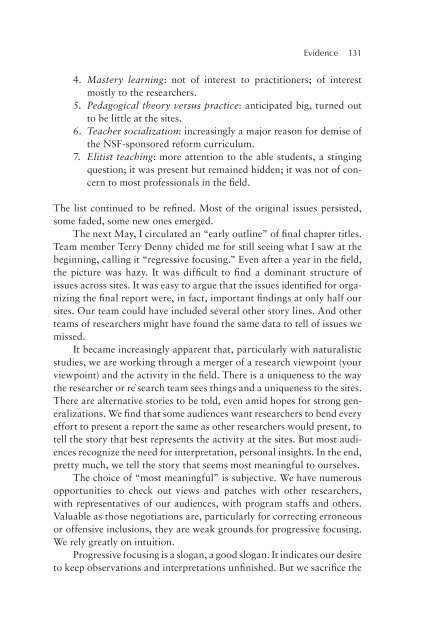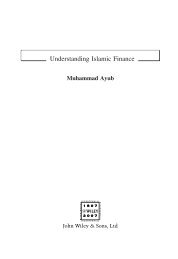How Things Work - Doha Academy of Tertiary Studies
How Things Work - Doha Academy of Tertiary Studies
How Things Work - Doha Academy of Tertiary Studies
You also want an ePaper? Increase the reach of your titles
YUMPU automatically turns print PDFs into web optimized ePapers that Google loves.
evidence 131<br />
4. Mastery learning: not <strong>of</strong> interest to practitioners; <strong>of</strong> interest<br />
mostly to the researchers.<br />
5. Pedagogical theory versus practice: anticipated big, turned out<br />
to be little at the sites.<br />
6. Teacher socialization: increasingly a major reason for demise <strong>of</strong><br />
the NSF-sponsored reform curriculum.<br />
7. Elitist teaching: more attention to the able students, a stinging<br />
question; it was present but remained hidden; it was not <strong>of</strong> concern<br />
to most pr<strong>of</strong>essionals in the field.<br />
The list continued to be refined. Most <strong>of</strong> the original issues persisted,<br />
some faded, some new ones emerged.<br />
The next May, I circulated an “early outline” <strong>of</strong> final chapter titles.<br />
Team member Terry Denny chided me for still seeing what I saw at the<br />
beginning, calling it “regressive focusing.” Even after a year in the field,<br />
the picture was hazy. It was difficult to find a dominant structure <strong>of</strong><br />
issues across sites. It was easy to argue that the issues identified for organizing<br />
the final report were, in fact, important findings at only half our<br />
sites. Our team could have included several other story lines. And other<br />
teams <strong>of</strong> researchers might have found the same data to tell <strong>of</strong> issues we<br />
missed.<br />
It became increasingly apparent that, particularly with naturalistic<br />
studies, we are working through a merger <strong>of</strong> a research viewpoint (your<br />
viewpoint) and the activity in the field. There is a uniqueness to the way<br />
the researcher or re`search team sees things and a uniqueness to the sites.<br />
There are alternative stories to be told, even amid hopes for strong generalizations.<br />
We find that some audiences want researchers to bend every<br />
effort to present a report the same as other researchers would present, to<br />
tell the story that best represents the activity at the sites. But most audiences<br />
recognize the need for interpretation, personal insights. In the end,<br />
pretty much, we tell the story that seems most meaningful to ourselves.<br />
The choice <strong>of</strong> “most meaningful” is subjective. We have numerous<br />
opportunities to check out views and patches with other researchers,<br />
with representatives <strong>of</strong> our audiences, with program staffs and others.<br />
Valuable as those negotiations are, particularly for correcting erroneous<br />
or <strong>of</strong>fensive inclusions, they are weak grounds for progressive focusing.<br />
We rely greatly on intuition.<br />
Progressive focusing is a slogan, a good slogan. It indicates our desire<br />
to keep observations and interpretations unfinished. But we sacrifice the

















